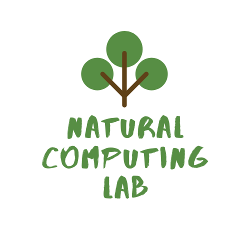With the term Natural Computing we refer to computing that is inspired by nature. This field of research tries to imitate the
nature in the way it “computes”, learning new computing models and computing paradigms used by nature for billions of years.
Studies in this field include theoretical and empirical understanding of these computing paradigms. The area of natural computing comprises various research streams, inspired from different principles underlying natural systems. For example, Evolutionary Algorithms make use of the concepts of evolution and natural selection to extract “good” solutions in a pool of candidate solutions, while Neural Networks are inspired by the interconnected structure in the human brain.
Another stream related to natural computing is that of Molecular Computing, where the aim is the implementation of algorithms in biological hardware. These types of computation take advantage from the huge parallelism we can get by using molecules: a single step of computation is relatively slow (only a fraction of a step can be done per second) but the number of operations that can be done at the same time is proportional to the number of molecules involved. This number is of
the order of 10^19, thus a molecular computer could be superior in speed to actual electronic computers by several orders of magnitude. But this is not the only advantage offered by biological hardware: other important advantages concern the energy consumption and the size needed to store information. Operations which involve bio-molecules are over a billion times more energy efficient with respect to electronic chips, and the information can be stored at a density of about one bit per nm^3, which is about a billion times as efficient as an usual electronic computer.
Natural Computing Lab research activity concerns the study of new computing models, inspired by various natural phenomena or making use of different materials present in nature. The study concerns both theoretical aspects related to the computation power and efficiency of the models, as well as the investigation to their application to the solution of complex computational problems.
Natural Computing Lab
Building U14 – Room 1046
Viale Sarca 336
20126 – MILANO
